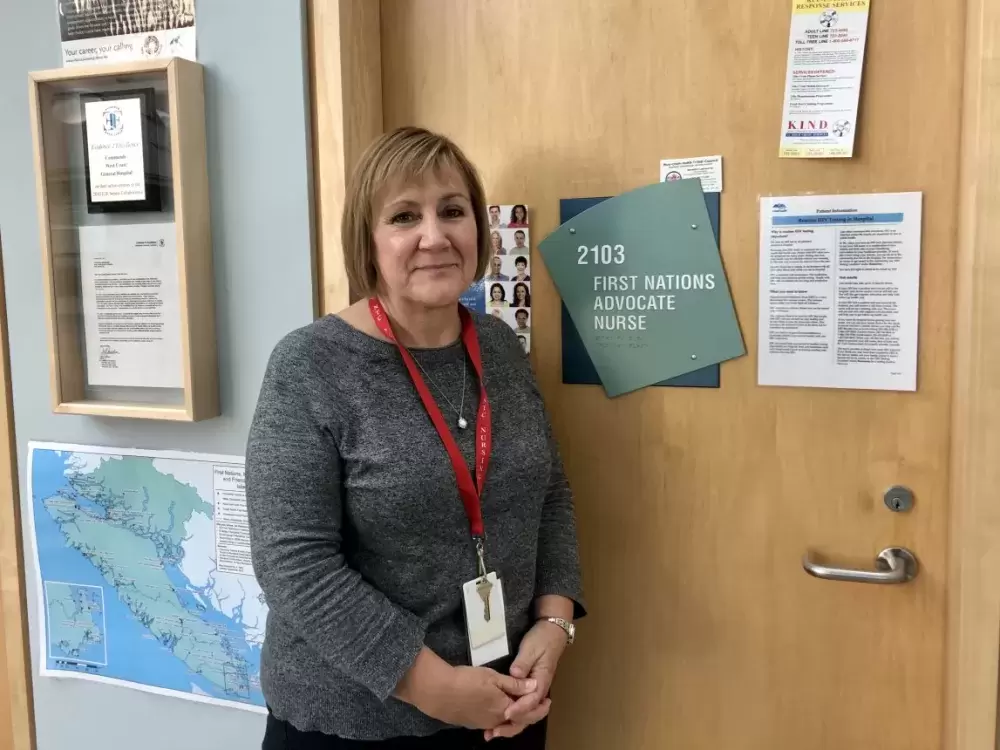First Nations Advocate Nurses are available for support seven days a week at West Coast General Hospital (WCGH) in Port Alberni. Embracing the values of hupiitst̓ał (‘helping each other’) and wiišahiiʔap (‘keeping healthy’), First Nations Advocate Nurses (FNANs) provide a much-needed bridge between the hospital and Aboriginal patients and their families.
The program has been running for over two decades, and is a collaboration between Nuu-chah-nulth Tribal Council and Island Health. FNANs can help explain health care issues or concerns, advocate on behalf of Aboriginal patients while in hospital, provide cultural awareness and insight to non-Aboriginal hospital staff, arrange medical travel, and help with many other services. It is a Vancouver Island-wide initiative, and is also available in Campbell River, the Comox Valley, Duncan and Cowichan, the Mount Waddington region, Nanaimo, and Victoria.
Deb Malvin, of Metlakatla, recently started working as a FNAN at West Coast General Hospital. Previously working in home care, she is enjoying her new position and sees a great need for the service.
“It’s exciting to be part of this,” she said in an interview at the hospital. “Knowing [people] have this office and someone here to support them seven days a week is a big help.”
Malvin collaborates with the hospital’s health teams, helping patients navigate the health care system. There are still many barriers facing Aboriginal people today in need of medical care. Much the way that schools and the education system can be a trigger for residential school survivors and their descendants, many Aboriginal people are also triggered by hospitals as institutions.
Barriers can be as simple as a lack of hearing, explained Malvin, or an inability to make sense of medical terminology. Accessing services, mistrust of institutions, feeling dismissed, and not having someone there to guide the patient through respectfully are also among these barriers, she elaborated.
Malvin is encouraged by many aspects of what she sees at West Coast General Hospital.
“The hospital’s been very welcoming and accommodating in suggestions we bring forward [as FNANs],” she stated. “They’re definitely very open to working with us. Just hearing the case managers talk about ‘Can we have a dietician see a client, because he’s not used to this kind of food; he’s used to eating more culturally-based food. What can we do to support that?’ – [Hearing that] is amazing.”
Melissa Shiplack is a registered nurse (RN) in the Emergency Department at WCGH. She works closely with FNANs, and acknowledges the high need for their services.
“[First Nations Advocate Nurses] are an invaluable resource, for many reasons,” she said in a phone interview. “I’m always open to learning about different cultures, and I do pride myself on knowing a little bit about First Nations culture, but I didn’t grow up in it, so I don’t know it as a whole. Just having somebody from that background that can connect with patients that come through – that’s really valuable.”
RN’s working in the high-paced Emergency Department don’t always have time to focus on the less immediate aspects of health care, such as social support and mental health.
“We don’t know all the resources that are out there for people,” said Shiplack. “If patients need services such as counselling or housing, FNAN’s are there to help.”
Shiplack also appreciates the connections that FNAN’s can build between hospital staff and Aboriginal patients.
“I have had really good experiences where a connection is built through a First Nations Liaison,” she stated. “When I’m not able to establish that connection on my own. . . It helps build that trust that’s so important in health care.”
Malvin is also aware of positive changes occurring in the hospital.
“I just had someone in this morning,” she said, “who was saying that he’s noticed a big change in the way that he and his family have been treated in the last couple of years, which is really heartwarming to hear. There’s been a lot of work undertaken here in the community and with health professionals towards respect and cultural sensitivity. It’s wonderful to hear.”







